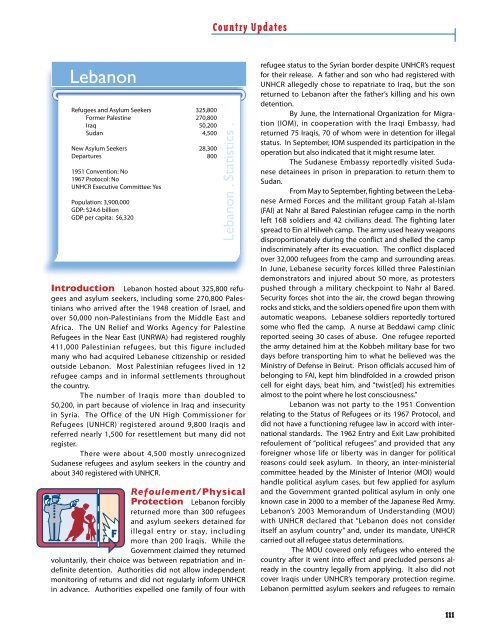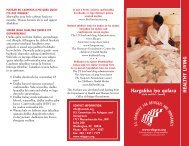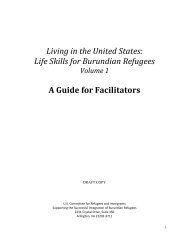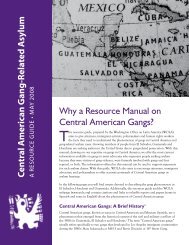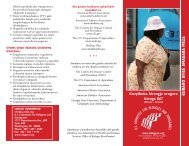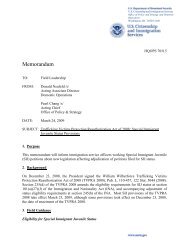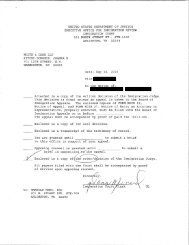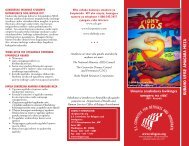Refugees and Asylum Seekers
Refugees and Asylum Seekers
Refugees and Asylum Seekers
Create successful ePaper yourself
Turn your PDF publications into a flip-book with our unique Google optimized e-Paper software.
Lebanon<br />
<strong>Refugees</strong> <strong>and</strong> <strong>Asylum</strong> <strong>Seekers</strong> 325,800<br />
Former Palestine 270,800<br />
Iraq 50,200<br />
Sudan 4,500<br />
New <strong>Asylum</strong> <strong>Seekers</strong> 28,300<br />
Departures 800<br />
1951 Convention: No<br />
1967 Protocol: No<br />
UNHCR Executive Committee: Yes<br />
Population: 3,900,000<br />
GDP: $24.6 billion<br />
GDP per capita: $6,320<br />
Lebanon . Statistics .<br />
Introduction Lebanon hosted about 325,800 refugees<br />
<strong>and</strong> asylum seekers, including some 270,800 Palestinians<br />
who arrived after the 1948 creation of Israel, <strong>and</strong><br />
over 50,000 non-Palestinians from the Middle East <strong>and</strong><br />
Africa. The UN Relief <strong>and</strong> Works Agency for Palestine<br />
<strong>Refugees</strong> in the Near East (UNRWA) had registered roughly<br />
411,000 Palestinian refugees, but this figure included<br />
many who had acquired Lebanese citizenship or resided<br />
outside Lebanon. Most Palestinian refugees lived in 12<br />
refugee camps <strong>and</strong> in informal settlements throughout<br />
the country.<br />
The number of Iraqis more than doubled to<br />
50,200, in part because of violence in Iraq <strong>and</strong> insecurity<br />
in Syria. The Office of the UN High Commissioner for<br />
<strong>Refugees</strong> (UNHCR) registered around 9,800 Iraqis <strong>and</strong><br />
referred nearly 1,500 for resettlement but many did not<br />
register.<br />
There were about 4,500 mostly unrecognized<br />
Sudanese refugees <strong>and</strong> asylum seekers in the country <strong>and</strong><br />
about 340 registered with UNHCR.<br />
F<br />
Refoulement/Physical<br />
Protection Lebanon forcibly<br />
returned more than 300 refugees<br />
<strong>and</strong> asylum seekers detained for<br />
illegal entry or stay, including<br />
more than 200 Iraqis. While the<br />
Government claimed they returned<br />
voluntarily, their choice was between repatriation <strong>and</strong> indefinite<br />
detention. Authorities did not allow independent<br />
monitoring of returns <strong>and</strong> did not regularly inform UNHCR<br />
in advance. Authorities expelled one family of four with<br />
refugee status to the Syrian border despite UNHCR’s request<br />
for their release. A father <strong>and</strong> son who had registered with<br />
UNHCR allegedly chose to repatriate to Iraq, but the son<br />
returned to Lebanon after the father’s killing <strong>and</strong> his own<br />
detention.<br />
By June, the International Organization for Migration<br />
(IOM), in cooperation with the Iraqi Embassy, had<br />
returned 75 Iraqis, 70 of whom were in detention for illegal<br />
status. In September, IOM suspended its participation in the<br />
operation but also indicated that it might resume later.<br />
The Sudanese Embassy reportedly visited Sudanese<br />
detainees in prison in preparation to return them to<br />
Sudan.<br />
From May to September, fighting between the Lebanese<br />
Armed Forces <strong>and</strong> the militant group Fatah al-Islam<br />
(FAI) at Nahr al Bared Palestinian refugee camp in the north<br />
left 168 soldiers <strong>and</strong> 42 civilians dead. The fighting later<br />
spread to Ein al Hilweh camp. The army used heavy weapons<br />
disproportionately during the conflict <strong>and</strong> shelled the camp<br />
indiscriminately after its evacuation. The conflict displaced<br />
over 32,000 refugees from the camp <strong>and</strong> surrounding areas.<br />
In June, Lebanese security forces killed three Palestinian<br />
demonstrators <strong>and</strong> injured about 50 more, as protesters<br />
pushed through a military checkpoint to Nahr al Bared.<br />
Security forces shot into the air, the crowd began throwing<br />
rocks <strong>and</strong> sticks, <strong>and</strong> the soldiers opened fire upon them with<br />
automatic weapons. Lebanese soldiers reportedly tortured<br />
some who fled the camp. A nurse at Beddawi camp clinic<br />
reported seeing 30 cases of abuse. One refugee reported<br />
the army detained him at the Kobbeh military base for two<br />
days before transporting him to what he believed was the<br />
Ministry of Defense in Beirut. Prison officials accused him of<br />
belonging to FAI, kept him blindfolded in a crowded prison<br />
cell for eight days, beat him, <strong>and</strong> “twist[ed] his extremities<br />
almost to the point where he lost consciousness.”<br />
Lebanon was not party to the 1951 Convention<br />
relating to the Status of <strong>Refugees</strong> or its 1967 Protocol, <strong>and</strong><br />
did not have a functioning refugee law in accord with international<br />
st<strong>and</strong>ards. The 1962 Entry <strong>and</strong> Exit Law prohibited<br />
refoulement of “political refugees” <strong>and</strong> provided that any<br />
foreigner whose life or liberty was in danger for political<br />
reasons could seek asylum. In theory, an inter-ministerial<br />
committee headed by the Minister of Interior (MOI) would<br />
h<strong>and</strong>le political asylum cases, but few applied for asylum<br />
<strong>and</strong> the Government granted political asylum in only one<br />
known case in 2000 to a member of the Japanese Red Army.<br />
Lebanon’s 2003 Memor<strong>and</strong>um of Underst<strong>and</strong>ing (MOU)<br />
with UNHCR declared that “Lebanon does not consider<br />
itself an asylum country” <strong>and</strong>, under its m<strong>and</strong>ate, UNHCR<br />
carried out all refugee status determinations.<br />
The MOU covered only refugees who entered the<br />
country after it went into effect <strong>and</strong> precluded persons already<br />
in the country legally from applying. It also did not<br />
cover Iraqis under UNHCR’s temporary protection regime.<br />
Lebanon permitted asylum seekers <strong>and</strong> refugees to remain<br />
111


